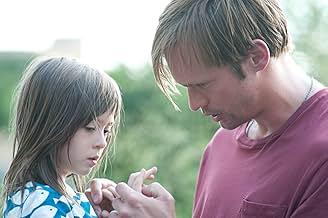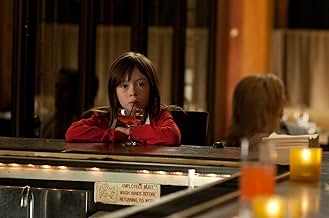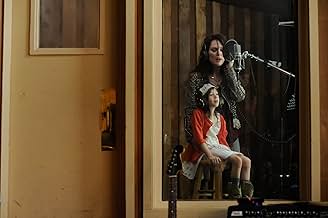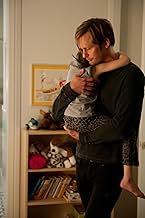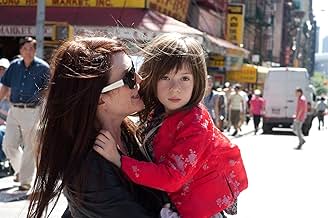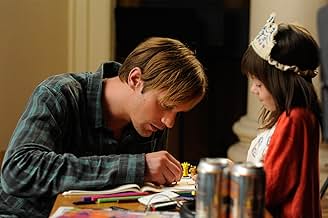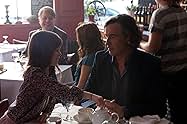AVALIAÇÃO DA IMDb
7,4/10
29 mil
SUA AVALIAÇÃO
Na cidade de Nova York, uma jovem fica no meio da desagradável batalha por custódia de seus pais.Na cidade de Nova York, uma jovem fica no meio da desagradável batalha por custódia de seus pais.Na cidade de Nova York, uma jovem fica no meio da desagradável batalha por custódia de seus pais.
- Direção
- Roteiristas
- Artistas
- Prêmios
- 3 vitórias e 8 indicações no total
Jesse Stone Spadaccini
- Martin
- (as Jesse Spadaccini)
Diana García
- Cecelia
- (as Diana Garcia Soto)
- Direção
- Roteiristas
- Elenco e equipe completos
- Produção, bilheteria e muito mais no IMDbPro
Avaliações em destaque
What Maisie Knew (2012)
A truly remarkable movie, filled with great acting, masterful editing and filming, and terrific writing. The basis of it all is the core here, a glimmering Henry James novel by the same title from over 100 years earlier. It's amazing how well the story holds up set in contemporary times, and changed in many necessary (and interesting) ways. What it keeps it going is the basic heartbreaking drama of a child tossed between two indifferent parents.
The mother might be seen as the main actor here, Julianne Moore, and this is the best I've ever seen her, I think. She gives a slightly fiery performance, and "slightly" is perfect, avoiding an overacting job suggested by her role as a slightly successful rock and roll star. She's terrifically awful and you come to hate her, appropriately.
The father (Steve Coogan) also puts in a sharp performance playing the lively, fun parent who is a selfish womanizer, hiding, sometimes, his flaws from his daughter. His relationship with the mother is not detailed very far because it is mostly one of distance and disdain. And mutual abuse.
The real star here is the girl, an utterly charming and beautifully effective actress, Onata, Aprile. She succeeds not by her delivery of great lines, but by her expressions. It's all because Henry James understood something delicate about children in these situations: they know what's going on and don't say it. And they also don't let it affect them because they simply can't afford to, or because they become hardened in some little ways, making them withdraw or act out. That Maisie maintains a delicious sweetness without playing the victim is quite remarkable, and Aprile is brilliant.
The secondary woman and man in the story are also terrific, and their roles grow as the movie grows. In fact, they become the sympathetic heart of things.
Pulling this together is the directing pair, McGehee and Siegel. This is their fifth movie together, and neither man has directed anything without the other. I've not seen any of the other four, but the reviews are middling to poor for all of them, so I'm not sure how far the novelty takes us. But it works here perfectly, making the complexity unfold quickly and coherently.
It's an ordinary drama on the surface, but let this one sink in over time. It's that good.
A truly remarkable movie, filled with great acting, masterful editing and filming, and terrific writing. The basis of it all is the core here, a glimmering Henry James novel by the same title from over 100 years earlier. It's amazing how well the story holds up set in contemporary times, and changed in many necessary (and interesting) ways. What it keeps it going is the basic heartbreaking drama of a child tossed between two indifferent parents.
The mother might be seen as the main actor here, Julianne Moore, and this is the best I've ever seen her, I think. She gives a slightly fiery performance, and "slightly" is perfect, avoiding an overacting job suggested by her role as a slightly successful rock and roll star. She's terrifically awful and you come to hate her, appropriately.
The father (Steve Coogan) also puts in a sharp performance playing the lively, fun parent who is a selfish womanizer, hiding, sometimes, his flaws from his daughter. His relationship with the mother is not detailed very far because it is mostly one of distance and disdain. And mutual abuse.
The real star here is the girl, an utterly charming and beautifully effective actress, Onata, Aprile. She succeeds not by her delivery of great lines, but by her expressions. It's all because Henry James understood something delicate about children in these situations: they know what's going on and don't say it. And they also don't let it affect them because they simply can't afford to, or because they become hardened in some little ways, making them withdraw or act out. That Maisie maintains a delicious sweetness without playing the victim is quite remarkable, and Aprile is brilliant.
The secondary woman and man in the story are also terrific, and their roles grow as the movie grows. In fact, they become the sympathetic heart of things.
Pulling this together is the directing pair, McGehee and Siegel. This is their fifth movie together, and neither man has directed anything without the other. I've not seen any of the other four, but the reviews are middling to poor for all of them, so I'm not sure how far the novelty takes us. But it works here perfectly, making the complexity unfold quickly and coherently.
It's an ordinary drama on the surface, but let this one sink in over time. It's that good.
What Maisie Knew (2012)
*** 1/2 (out of 4)
Excellent updating of the Henry James story about a divorcing couple (Julianne Moore, Steve Coogan) and the impact that their behavior has on their young daughter Maisie (Onata Aprile) as well as the new step parents (Alexander Skarsgard, Joanna Vanderham). WHAT MAISIE KNEW isn't going to appeal to a mass audience but it's certainly a terrific little gem from directors Scott McGehee and David Siegel. What I enjoyed the most was the unique way it told the story. We never get the "full" story of everything going on but instead we get the bits and pieces that a child would remember about something. Instead of finding out why a parent leaves her at school, we just see how the child remembers being left alone. Instead of knowing what the parents are fighting about, we see how it impacts the child and her memories of it. This is a very unique way to tell the story and it gives a touch of freshness to a storyline (divorce) that we've seen before. It also doesn't hurt that the film doesn't shy away from some rather ugly behavior from the parents and especially the Moore character. To say she's an unworthy mother would be an understatement but I appreciate the film playing things straight and not ever trying to make something cute. It also doesn't hurt that we get some of the best performances that you're going to see all year with Moore doing an excellent job in her role as the busy mother who doesn't have enough time for her daughter. This is a rather ugly role so it was brave for the actress to take it on. The same with Coogan who also plays a jerk and delivers with some strong work. Both Skarsgard and Vanderham really steal the film in the roles of the step parents who find themselves being forced to deal with something they never expected. Both of them should be remembered at Oscar time but we'll see how that goes. The same is true for Aprile who doesn't get too much dialogue but we constantly see her reactions to the things going on around here. This is such an excellent and quiet performance and something you'd see in a silent movie. WHAT MAISIE KNEW is about a pretty ugly subject matter but it's a fascinating look at it for those who enjoy great performances and a unique story.
*** 1/2 (out of 4)
Excellent updating of the Henry James story about a divorcing couple (Julianne Moore, Steve Coogan) and the impact that their behavior has on their young daughter Maisie (Onata Aprile) as well as the new step parents (Alexander Skarsgard, Joanna Vanderham). WHAT MAISIE KNEW isn't going to appeal to a mass audience but it's certainly a terrific little gem from directors Scott McGehee and David Siegel. What I enjoyed the most was the unique way it told the story. We never get the "full" story of everything going on but instead we get the bits and pieces that a child would remember about something. Instead of finding out why a parent leaves her at school, we just see how the child remembers being left alone. Instead of knowing what the parents are fighting about, we see how it impacts the child and her memories of it. This is a very unique way to tell the story and it gives a touch of freshness to a storyline (divorce) that we've seen before. It also doesn't hurt that the film doesn't shy away from some rather ugly behavior from the parents and especially the Moore character. To say she's an unworthy mother would be an understatement but I appreciate the film playing things straight and not ever trying to make something cute. It also doesn't hurt that we get some of the best performances that you're going to see all year with Moore doing an excellent job in her role as the busy mother who doesn't have enough time for her daughter. This is a rather ugly role so it was brave for the actress to take it on. The same with Coogan who also plays a jerk and delivers with some strong work. Both Skarsgard and Vanderham really steal the film in the roles of the step parents who find themselves being forced to deal with something they never expected. Both of them should be remembered at Oscar time but we'll see how that goes. The same is true for Aprile who doesn't get too much dialogue but we constantly see her reactions to the things going on around here. This is such an excellent and quiet performance and something you'd see in a silent movie. WHAT MAISIE KNEW is about a pretty ugly subject matter but it's a fascinating look at it for those who enjoy great performances and a unique story.
10kcfl-1
This is what I hope Henry James would have written, were he alive today. The book is tough sledding, late James when he was dictating his novels (due to tendinitis), and there was no holding him back. At least one Harvard professor called him "the greatest American novelist," but this work is deservedly minor.
The movie was perfect, in the top 1% of all I've seen. The style was the antithesis of James, radical "showing" instead of "telling."
I think the title should have been "What Maisie SAW," but that's too titillating. What she knew or felt only her future therapist will learn. We do have a hint though when her father throws her mother's flowers away, and M explains, "He was allergic."
The movie was perfect, in the top 1% of all I've seen. The style was the antithesis of James, radical "showing" instead of "telling."
I think the title should have been "What Maisie SAW," but that's too titillating. What she knew or felt only her future therapist will learn. We do have a hint though when her father throws her mother's flowers away, and M explains, "He was allergic."
She knew who really loved her and who cared for her...
She also knew that mummy and daddy were too busy arguing to notice that the pizza guy had arrived. "What Maisie Knew" practically opens mid-tirade and Maisie, a wide-eyed six- year old girl has heard it all before, she skips innocently through their art-deco New York apartment, past her none-the-wiser parents, pulls out a fistful of dollar bills from her own piggy-bank and returns to the door to pay for the pizza.
"What Maisie Knew" is a re-visioning of the 19th-Century Henry James novel by the same name. The story follows Maisie, played by the captivating Onata Aprile , caught in the midst of a custody battle between her aging rock star mother Susanna and art-dealer father, Beale.
Susanna intensely played by the always-brilliant Julianne Moore and Beale (Steve Coogan) only unite in their neglect and emotional abandonment of little Maisie, and both of whom are not above using their daughter as a pawn in their war game.
As they battle on with the messy custody arrangements, Beale marries former nanny Margo (Joanna Vanderham), and in retaliation Susanna also remarries, to young bartender Lincoln, (Alexander Skargard).
As Maisie moves between her parents now separate lives, we unearth a natural connection between Maisie and Lincoln. You feel safe when he is around, even though he doesn't know what he is doing half the time and like Maisie, is out of his depth and unsure where he stands in Susanna's life.
Constantly, Susanna relies on Lincoln to pick Maisie up from school, drop her off, and spend time with her and improvise when necessary. But as the affectionate bond between her new husband and her daughter grows, Susanna becomes jealous of the relationship to the point of enforcing to Lincoln "you don't get a bonus for making her like you".
"You don't deserve her," Lincoln lashes out as Susanna breaks up with him, expressing exactly what the viewer has been thinking. But as another relationship in Maisie's life ends, it's her resilience that keeps us captivated and in awe of such a brave girl.
The story is told from Maisie's perspective including many shots even captured from Maisie's eye level so we get a fresh look at an unoriginal story. Instead of finding out why a parent leaves her at school, we just see how the child remembers being left alone. Instead of knowing what the parents are fighting about, we see how it impacts the child and her memories of it.
"What Masie knew" is a bleak film but hopeful, it demonstrates that innocence is not something to be wasted and used but cherished and protected. What Masie knew is to trust the people who actually take care of her - never voicing an allegiance against anyone but accepting love when it's offered
She also knew that mummy and daddy were too busy arguing to notice that the pizza guy had arrived. "What Maisie Knew" practically opens mid-tirade and Maisie, a wide-eyed six- year old girl has heard it all before, she skips innocently through their art-deco New York apartment, past her none-the-wiser parents, pulls out a fistful of dollar bills from her own piggy-bank and returns to the door to pay for the pizza.
"What Maisie Knew" is a re-visioning of the 19th-Century Henry James novel by the same name. The story follows Maisie, played by the captivating Onata Aprile , caught in the midst of a custody battle between her aging rock star mother Susanna and art-dealer father, Beale.
Susanna intensely played by the always-brilliant Julianne Moore and Beale (Steve Coogan) only unite in their neglect and emotional abandonment of little Maisie, and both of whom are not above using their daughter as a pawn in their war game.
As they battle on with the messy custody arrangements, Beale marries former nanny Margo (Joanna Vanderham), and in retaliation Susanna also remarries, to young bartender Lincoln, (Alexander Skargard).
As Maisie moves between her parents now separate lives, we unearth a natural connection between Maisie and Lincoln. You feel safe when he is around, even though he doesn't know what he is doing half the time and like Maisie, is out of his depth and unsure where he stands in Susanna's life.
Constantly, Susanna relies on Lincoln to pick Maisie up from school, drop her off, and spend time with her and improvise when necessary. But as the affectionate bond between her new husband and her daughter grows, Susanna becomes jealous of the relationship to the point of enforcing to Lincoln "you don't get a bonus for making her like you".
"You don't deserve her," Lincoln lashes out as Susanna breaks up with him, expressing exactly what the viewer has been thinking. But as another relationship in Maisie's life ends, it's her resilience that keeps us captivated and in awe of such a brave girl.
The story is told from Maisie's perspective including many shots even captured from Maisie's eye level so we get a fresh look at an unoriginal story. Instead of finding out why a parent leaves her at school, we just see how the child remembers being left alone. Instead of knowing what the parents are fighting about, we see how it impacts the child and her memories of it.
"What Masie knew" is a bleak film but hopeful, it demonstrates that innocence is not something to be wasted and used but cherished and protected. What Masie knew is to trust the people who actually take care of her - never voicing an allegiance against anyone but accepting love when it's offered
I've read five previously posted reviews of this film and see no reason to repeat what they've already said. I agree, for the most part, with the positive ones. And I suspect the negative ones were written by people whose established taste in movies should have steered them away from seeing this one in the first place.
What I'll add is, I guess, a mostly personal perspective. I've found that I am lately much more drawn to smaller, more deeply felt movies than to bigger, slicker, higher-production-value ones. To "What Maisie Knew," for example, than to "The Great Gatsby." Even though both source novels share a similar interior aesthetic, the treatment in the former stays inside the characters, where James focused the original (thus causing one of the previous reviewers' comments to the effect that "nothing happens" in the movie), while the latter (possibly because of Luhrmann's well-established directorial predilections)stays resolutely focused on the exterior spectacle and barely skims the surface of Fitzgerald's deeply rendered characterizations.
If you like smaller, more closely observed and deeply felt films, you'll like this one.
What I'll add is, I guess, a mostly personal perspective. I've found that I am lately much more drawn to smaller, more deeply felt movies than to bigger, slicker, higher-production-value ones. To "What Maisie Knew," for example, than to "The Great Gatsby." Even though both source novels share a similar interior aesthetic, the treatment in the former stays inside the characters, where James focused the original (thus causing one of the previous reviewers' comments to the effect that "nothing happens" in the movie), while the latter (possibly because of Luhrmann's well-established directorial predilections)stays resolutely focused on the exterior spectacle and barely skims the surface of Fitzgerald's deeply rendered characterizations.
If you like smaller, more closely observed and deeply felt films, you'll like this one.
Você sabia?
- CuriosidadesIn an interview on the NPR program "Fresh Air", Julianne Moore said that she drew on Courtney Love and Patti Smith for inspiration for her character in this movie, who is (like Love and Smith) a rock star who is also a mother.
- ConexõesFeatured in At the Movies: Episode #10.26 (2013)
- Trilhas sonorasRockabye Baby
Performed by Julianne Moore
Principais escolhas
Faça login para avaliar e ver a lista de recomendações personalizadas
- How long is What Maisie Knew?Fornecido pela Alexa
Detalhes
- Data de lançamento
- País de origem
- Centrais de atendimento oficiais
- Idioma
- Também conhecido como
- What Maisie Knew
- Locações de filme
- The High Line, Manhattan, Nova Iorque, Nova Iorque, EUA(Maisie and Lincoln play at the High Line)
- Empresas de produção
- Consulte mais créditos da empresa na IMDbPro
Bilheteria
- Orçamento
- US$ 6.000.000 (estimativa)
- Faturamento bruto nos EUA e Canadá
- US$ 1.066.471
- Fim de semana de estreia nos EUA e Canadá
- US$ 21.480
- 5 de mai. de 2013
- Faturamento bruto mundial
- US$ 2.711.379
- Tempo de duração1 hora 39 minutos
- Cor
- Mixagem de som
- Proporção
- 2.35 : 1
Contribua para esta página
Sugerir uma alteração ou adicionar conteúdo ausente

Principal brecha
By what name was Pelos Olhos de Maisie (2012) officially released in India in English?
Responda






